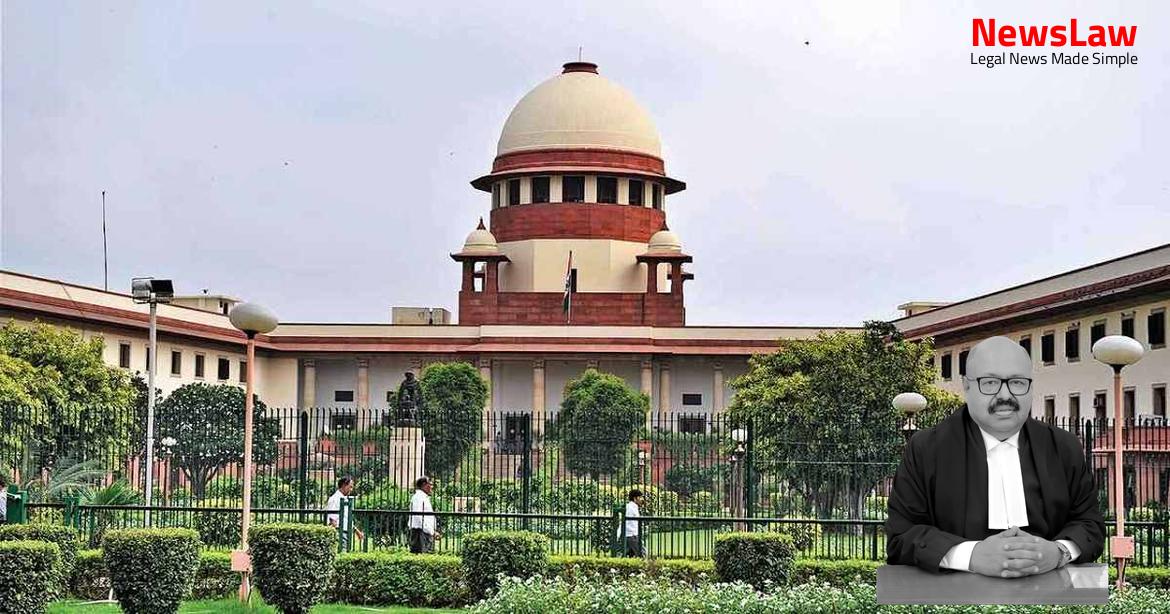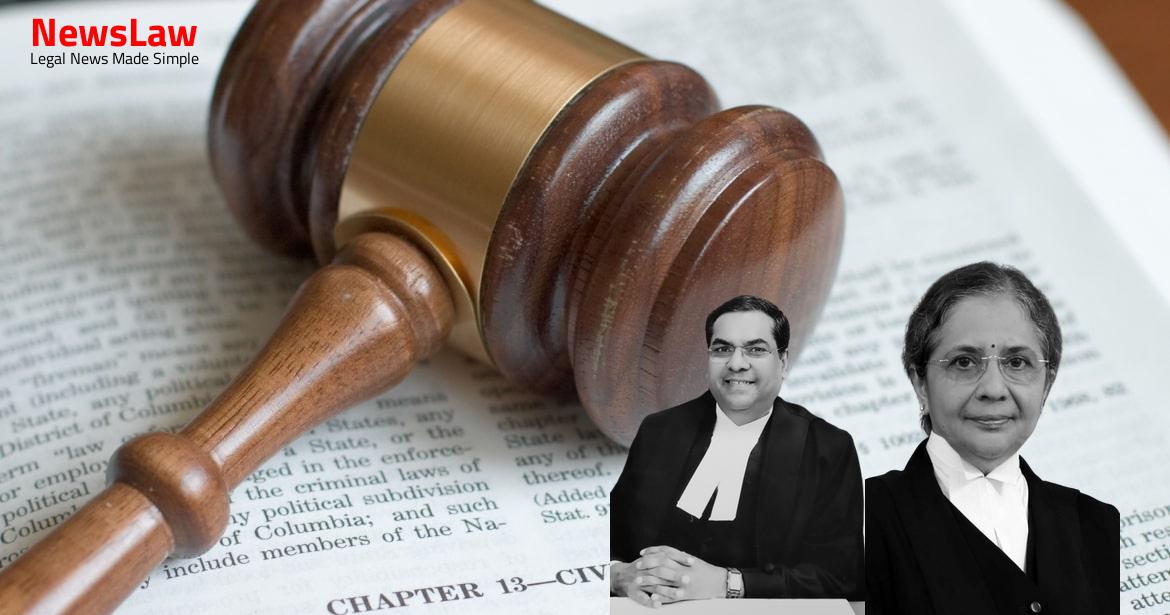In the realm of contract law and arbitration, the boundaries of jurisdiction play a crucial role in determining the validity and legality of decisions made by arbitrators. This case delves into the nuances of jurisdictional limits, highlighting the significance of abiding by the terms set forth in the original contract. The court’s legal analysis sheds light on the complexities of interpreting and enforcing contractual agreements within the framework of arbitration proceedings.
Facts
- The Respondent invoked the arbitration clause in the dealership agreement and requested the Director (Marketing) of the Appellant to appoint an Arbitrator.
- The Arbitrator appointed had no jurisdiction to adjudicate disputes pertaining to the lease agreement, resulting in termination of the Claimant’s dealership.
- The Claimant is not entitled to the sum of Rs.45,28,000/- and interest thereon due to serious irregularities.
- The Lease Agreements of Mr. Bajirao Jadhav and the Claimant had different terms and conditions.
- The Appellate Authority dismissed the Respondent’s appeal against the termination of the dealership agreement.
- The Respondent filed a Statement of Claims challenging the termination of the dealership agreement and made prayers for damages and amendment of the lease agreement.
- The Arbitrator’s award dated 04.11.2010 affirmed the termination of the dealership agreement due to breaches by the Claimant.
- The Arbitration proceedings were concluded with the award published on 4.11.2010.
- The Appellant filed an application under Section 34 of the Arbitration and Conciliation Act, 1996 to set aside the award.
- The Appellant contended that the alternative prayers of the Claimant were outside the ambit of the arbitration proceedings.
- The Claimant submitted that the low rent was agreed upon in exchange for the dealership of a petrol pump.
- The Appellant terminated the dealership, leading to appeals by the Respondent to the Appellate Authority and Executive Director seeking revocation.
- The High Court partially allowed the Respondent’s Arbitration Appeal and dismissed the Appellant’s Arbitration Appeal.
- High Court partly allowed the Arbitration Appeal No.19 of 2013 filed by the Respondent and dismissed Arbitration Appeal No.39 of 2013 filed by the Appellant.
- District Court had no scope to interfere with the impugned award as per Section 34 of the Arbitration Act.
- The High Court permitted enhancement of the lease rent but denied the reduction of the lease period.
- The High Court held that the Arbitrator did not have the authority to decrease the lease period as per the advertisement.
- District Judge-3 modified the award by deleting the clause related to lease period based on the principle that terms causing grave injustice can be overlooked.
- The District Judge upheld the rent enhancement to Rs. 10,000/- with a 10% increase after every three years.
Also Read: Analysis of Financial Statements as Acknowledgment in Limitation Act Case
Issue
- Main issues before the Arbitral Tribunal involved determining breaches of MDG Guideline and Dealership Agreement
- Question of whether the Claimant is entitled to restoration of rights
- Validity and legality of the Termination letter dated 20.08.2009 was in consideration
- Claimant’s entitlement to an Order/Decree against the Respondent for the sum of Rs.45,28,000 was to be established
Also Read: Landmark Legal Analysis in Conviction Appeal Case
Arguments
- The Respondent argued that the Claimant had been accepting the monthly rent without any objections since 2005.
- The Respondent claimed that the issue of monthly rent was raised as an afterthought in the Statement of Claim.
- The Appellant contended that the Respondent could not seek to modify the terms of the registered lease deed without challenging it.
- The Appellant also argued that the alternative prayers of the Claimant regarding lease rent increase were not within the ambit of the arbitration proceedings.
- The High Court noted that the Appellant did not raise certain contentions before the Arbitrator or in the application filed under Section 34 of the Arbitration Act.
- The High Court stated that raising new contentions at that stage would imply acceptance of the Arbitrator chosen for the dispute under the lease agreement.
- The claimant agreed to the extended lease period due to the dealership agreement being coupled with it.
- The lease agreement specified an arbitrator, the Managing Director of the Appellant or a nominee.
- The appointed arbitrator, Mr. B.L. Parihar, was designated via the Dealership Agreement by the Director (Marketing) of the Appellant.
- The claimant argued before the arbitrator that they were forced by the respondent to agree to a longer lease period than initially permitted.
- The lease rent of Rs.1,750/- per month was not at the market rate at that time.
Also Read: Analysis of Territorial Jurisdiction in Arbitration Transfer Petition
Analysis
- The lease agreement and the dealership agreement are distinct and independent agreements.
- Disputes under the lease agreement were to be referred to the Managing Director of the Appellant, while disputes under the dealership agreement were to be referred to the Director (Marketing) of the Corporation.
- The High Court overlooked the specific issue of jurisdiction regarding increasing the monthly lease rent from Rs.1750 to Rs.35,000, which was before the Arbitrator.
- The impugned award regarding lease rent and lease period was beyond the Arbitrator’s competence appointed under the dealership agreement.
- The dealership agreement was inherently terminable, whereas the lease agreement was for a fixed period of 29 years.
- The Arbitral award is liable to be set aside for failing to act in terms of the contract or ignoring specific contract terms.
- The dealership agreement between the Appellant and the Respondent was for a period of fifteen years from 15th November 2006, with successive renewal periods of one year each.
- The Corporation reserved the right to stop, suspend, or restrict supplies to the Dealer and sales from the premises in case of any breach of covenant by the Dealer.
- Disputes under the lease agreement were to be referred to the arbitration of the Managing Director of the Appellant.
- The lease agreement and the dealership agreement were considered distinct and independent agreements.
- The Corporation had the discretion to terminate the agreement upon the occurrence of certain events as specified in Clause 56 of the agreement.
- The Corporation had the right to appoint additional dealers without the Dealer’s consent and terminate the agreement if the Dealer failed to meet minimum product purchase quantities.
- The Dealer was obligated to comply with all laws, rules, and regulations related to the business, failing which the Corporation had the right to discontinue supplies and even terminate the agreement.
- The Corporation’s officers could inspect the management of the retail outlet at any time.
- The Corporation could increase or revise the license fee for the premises without prior notice to the Dealer.
- The lease agreement allowed the LESSEE to assign, transfer, sublet, or part with the possession of the DEMISED PREMISES without the consent of the LESSOR.
- The High Court did not commit any error in setting aside an award where the Arbitrator had effectively rewritten the contract and awarded a higher rate than agreed.
- In India, the public policy argument must be based on exceptional circumstances where fundamental notions or principles of justice are infringed.
- Judges interpret statutes and their words are not to be interpreted as statutes themselves.
- An award can be considered against public policy if it is in violation of a statutory provision, ignores the terms of a contract, or is unreasonable or perverse.
- Judicial utterances should be understood in the context of the particular case and not as absolute provisions.
- An Arbitral Tribunal is entitled to interpret the terms of a contract while adjudicating a dispute but cannot exceed the powers given by the contract.
- Rewriting a contract for the parties would breach fundamental principles of justice and could shock the conscience of the Court, allowing for intervention.
- The role of an Arbitrator is to arbitrate within the terms of the contract; going beyond that would be acting without jurisdiction.
Decision
- The Appellant took a plot of land on lease for 29 years to set up a retail outlet for sale of petroleum products
- The deed of lease was registered and the property was owned by SHRI. LAXMAN DAGDU THITTE
- The lease rent was increased from Rs.1750 to Rs.10000 with a 10% increase every three years
- The lease period was to be kept as per the period mentioned in the newspaper advertisement of 6.7.2005
- The Arbitrator’s decision to increase rent and reduce the lease period was set aside in the appeal judgment
- The claimant no longer has income from the terminated dealership and relies on the low lease rent for survival
- The claimant is entitled to a reasonable increase in the monthly lease rent for survival, but not to the extent of Rs.35000 as claimed
Case Title: INDIAN OIL CORPORATION LTD.THROUGH ITS SENIOR MANAGER Vs. M/S. SHREE GANESH PETROLEUM RAJGURUNAGAR THROUGH ITS PROP. MR. LAXMAN DAGDU THITE (2022 INSC 130)
Case Number: C.A. No.-000837-000838 / 2022



